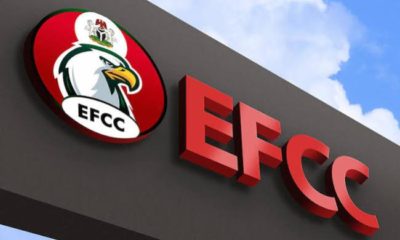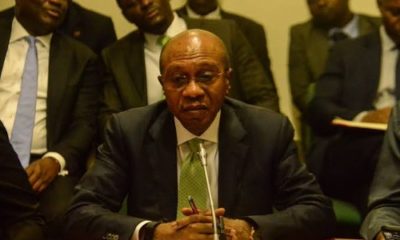Finance
CBN now to allocate forex to end users

ABUJA—The Central Bank of Nigeria, CBN, is now to allocate foreign exchange to end-users, with priority given to matured Letters of Credit, importation of petroleum products, raw materials and machinery. This is in a bid to effectively manage the nation’s depleted foreign reserves.
This came as Nigeria’s foreign trade report for imports and exports during the third quarter of 2015 has shown an unprecedented decline reflecting the level of stress the economy has witnessed since this year.
The Director of Monetary Policy of the CBN, Mr. Moses Tule, who spoke in Abuja, at the weekend said under the new regime, those who take pleasure in wasting the nation’s foreign exchange in shopping abroad would find it increasingly difficult.
His words: “Our priority as a nation for the allocation or use of foreign exchange is for the settlement of matured Letters of Credit, LCs, that have been opened for importation; for the importation of petroleum products until such a time when we have our refineries fully operational and we are not in a position to import fuel again to ensure that the wheels of economic development continue turning and running and for the importation of raw materials.
“By the time we meet these three priority areas, you will discover that people who are using their debit cards overseas for shopping can never be on the priority list.
“We do understand that it may not be all that the demands will be for shopping. We have seen that the reserves are not there and what we have we will use essentially for the purposes that will keep the wheels of the economy running. We have to produce for export, we can’t continue to depend only on the export of crude oil.”
The director said that the CBN synpathised with Nigerians on the ban of the use of debit cards abroad but that there was nothing the institution could do on its own to change the nation’s foreign exchange earnings, as it largely depends on oil receipts.
“It is a healthy development where Nigerians can no longer use debit cards abroad. But it is inconvenient. Right now the country is going through very difficult times because of developments in the oil market. Foreign exchange under the condition Nigeria has found itself has become a seasonal commodity. Seasonal in the sense that it depends on the movement of the price of oil. If oil prices are high, then we build reserves, if oil prices are low, then we have no reserves and we will be in a crisis situation.
“Does the CBN sympathize with the situation Nigerians find themselves not being able to use their debit cards outside the country? Yes the CBN certainly does sympathize with the hardship Nigerians are facing, but can the CBN stop it? The CBN cannot stop what the banks are doing now and the reason is very obvious,” he said.
Mr. Tule indicated that the policy would not be reviewed any time in the short term, as according to him, the reserves which currently stand at about $29 billion would have to be built up to a figure of around $50 billion before free use of the foreign exchange could be restored.
The moment we begin to build reserves, we expect that just as this restrictions were not there, most of the restrictions will be lifted but for now, every hand needs to be on deck. We need to earn foreign exchange as a country. You can improve your business processes in order to export and earn foreign exchange and that is what the country is calling on patriotic Nigerian businessmen to do.”
Economic downturn: Foreign trade drops by N2.5 trillion
Meanwhile, Nigeria’s foreign trade report for imports and exports during the third quarter of 2015 has shown an unprecedented decline reflecting the level of stress the economy has witnessed since this year.
A huge drop in crude oil export appeared to have taken a toll on the ability of the economy to finance imports as the Central Bank of Nigeria, CBN, tightened its restrictions of foreign exchange utilisation within the period.
According to the foreign trade statistics released by National Bureau of Statistics, NBS, compared to the corresponding quarter of 2014, the value of total merchandise trade comprising Nigeria’s imports and exports in third quarter 2015 decreased by N2.5 trillion or 38.3 per cent. Total value of trade in the third quarter of 2015 was N4.02 trillion as against N6.4 trillion in the corresponding period of last year.
This, according to the report, was as a result of a N132.4 billion or 7.3 per cent and N 2.4 trillion or 50.3 per cent decline in imports and exports respectively relative to the corresponding quarter in 2014.
The third quarter 2015 reports also show steady decline in the economy sector as the value dropped by N338 billion against the preceeding quarter of 2015.
Quarter-on-quarter, the sharp decline in exports and slight decrease in imports contributed to continued fall in the Country’s trade balance, by 32 per cent or N 303.1 billion during the third quarter of 2015.
Total value of Nigeria’s imports during the quarter stood at N1.7 trillion, a slight decrease of one per cent from what was recorded in the preceding quarter, but, year-on-year analysis showed that the country’s imports decreased significantly by N132.4 billion or 7.3 per cent, reflecting the significant difference in the economic conditions between the periods.
Total value of the nation’s exports totaled N 2.3 trillion in the third quarter of 2015, a decrease of N320.6billion or 12.1 per cent, over the value N2.65 trillion recorded in the preceding quarter.
This decline, according to NBS, was attributed to a fall in crude oil exports by N372.8 billion or 18.8 per cent over the preceding quarter.
The structure of Nigeria’s imports by section was dominated by the imports of “Boilers, machinery and appliances; parts thereof” which accounted for 24 per cent of the total value of imports in the third quarter of 2015.
Other commodities which contributed noticeably to the value of imports in the review period were “Mineral products” at 15.3 per cent, “Vehicles, aircraft and parts thereof; vessels etc” at 8.8 per cent, “Products of the chemical and allied industries” at 8.6 per cent, and “Base metals and articles of base metals” at 8.4 per cent.
Imports classified by Broad Economic Category, revealed that Industrial Supplies “ranked first with N470.3billion or 27.9 per cent of total imports. This was followed by “Capital Goods and parts” with the value of N398.7 billion or 23.6 per cent, and “Food and Beverage” with N322.8billion or 19.1 per cent. The value of Motor Spirit (petroleum products) stood at N220.6 billion.
Nigeria’s imports by direction (country of origin), showed that the country imported goods mostly from China, United States, Belgium, Netherlands and India which respectively accounted for N459.4 billion or 27.2 per cent, N160.6 billion or 9.5 per cent, N128.3billion or 7.6 per cent, N101.8billion or 6 per cent and N97.4billion or 5.8 per cent of the total value of goods imported during the quarter.
Further analysis of Nigeria’s imports by continent, revealed that the country consumed goods largely from Asia with imports valued at N764.5 billion or 45.3 per cent of total imports while it imported goods valued at N596.4 billion or 35.3 per cent from Europe and N241.3 billion or 14.3 per cent from the Americas.
Import trade from Africa stood at N65.4 billion or 3.9 per cent while imports from the region of ECOWAS amounted to N16.3 billion.
The structure of exports is still dominated by crude oil, which contributed N.6 trillion or 69.1 per cent to the value of total domestic exports in the third quarter of 2015. Natural liquefied gas recorded N265.2 billion of the total export value during the period under review.
Exports by section revealed that Nigeria exported mainly “Mineral Products”, which accounted for N2.025 trillion or 86.8 per cent of the total exports.
Other products exported by Nigeria include those categorized as “vehicles, aircraft and parts thereof; vessels etc.” at N216.2 billion or 9.3 per cent; “prepared foodstuffs; beverages, spirits and vinegar; tobacco” at N33.1 billion or 1.4 per cent, and “vegetable products” at N9.3 billion or 0.4 per cent of total exports.
Vanguard-
Banking
CBN Denies Currency Devaluation

The Central Bank of Nigeria (CBN) has refuted claims of devaluing the.
Earlier reports suggested that the CBN had devalued the Naira, lowering its exchange rate from N631 to the dollar, compared to the previous day’s rate of N461.60 at the Importers and Exporters (I&E) window.
However, the Central Bank of Nigeria (CBN) released a statement on Thursday through its Acting Head of Corporate Communications, Dr. Isa Abdulmumin, categorizing the report as false information.
In the statement titled ‘CBN Has Not Devalued The Naira’, he said the attention of the apex bank was drawn to the news report by an Abuja based newspaper edition of June 1, 2023, titled “CB Devalues Naira To 630/51”.
However, the CBN stated categorically that the news report was replete with outright FALSEHOODS and destabilizing innuendos, ‘reflecting potentially willful ignorance of the said medium as to the workings of the Nigerian Foreign Exchange Market.’
“For the avoidance of doubt, the exchange rate at the Investors’ & Exporters (I&E) window traded this morning (June 1, 2023) at N465/USS1 and has been stable around this rate for a while.
“The public is hereby advised to ignore the news report by Daily Trust in its entirety, as it is speculative and calculated at causing panic in the market,” the CBN spokesman added.
He, therefore, advised media practitioners to verify their facts from the Central Bank of Nigeria before publishing in order not to misinform the public.
Banking
BREAKING: CBN Increases Interest Rate By 0.5%

The interest rate in Nigeria has been raised to 18.5 percent, up by 0.5 percent, from 18 percent where it was pegged in March 2023.
The Central Banks of Nigeria’s (CBN) Monetary Policy Committee (MPC) resolved to this effect at its third meeting of 2023 in Abuja, on Wednesday.
Governor, CBN, Godwin Emefiele, made the disclosure in the communiqué of the MPC’s meeting, thereafter.
While engaging the media at the end of the two-day meeting, Emefiele, said the committee voted to keep the asymmetric corridor at +100 and -700 basis points around the MPR.
In the view of the MPC, rising inflation rate is traceable to the high energy cost and challenges around the supply chain, among others, which lie outside the corridors of the CBN.
Emefiele said, “The current trend in price development would continue to be monitored by the bank with greater collaboration with fiscal authority to address the drivers of inflation.”
Biztellers reports that the CBN had effected six consecutive interest rate increases, which has seen the rate move from 11.5 percent in March 2022 to 18.5 percent in May 2023.
Finance
Dangers Lurk As Nigerians Resort To Refurbished Gas Cylinders

In Nigeria, people have been forced to come up with creative solutions to cope with the effects of inflation and the economic crisis.
These improvised strategies have not only helped individuals save money, but also enabled them to stay afloat during difficult times.
In a concerning development, the recent trend of boycotting the high cost of cooking gas cylinders in Nigeria may pose a greater risk to lives than it does in terms of saving money.
Economy&Lifestyle investigations have revealed that the soaring prices of gas cylinders have reached a point where it has become increasingly challenging for average households to afford them, let alone refill them with gas.
The situation is further exacerbated by the fact that the pump price of kerosene, which would typically serve as an alternative, has become prohibitively expensive.
Upon investigation, it was found that the prices of gas cylinders vary depending on their sizes. A 3kg gas cylinder is priced at N14,000, while a 5kg cylinder costs N16,000. The larger cylinders are even more costly, with a 6kg cylinder priced at N17,000 and a 12.5kg cylinder costing N19,000.
Additionally, the expense continues when it comes to filling these cylinders with cooking gas, as it costs N2,600 for a 3kg cylinder, N5,200 for a 6kg cylinder, N8,950 for a 10.5kg cylinder, and N10,650 for a 12.5kg cylinder.
Consequently, an average household that needs to replace a worn-out 5kg cylinder would have to come up with N20,250 to purchase a new cylinder and fill it with gas, which can be a difficult feat to achieve.
As a result, many people have resorted to refurbishing their old cylinders and trying to use them as best as they can. However, this approach poses a significant danger.
Mrs. Rukayat Adesoji, a trader, shared her experience regarding her gas cylinder, which had become rusted and could no longer stand upright since last month. Due to the exorbitant prices of purchasing new cylinders, she resorted to seeking the assistance of a welder.
The welder patched the legs of the cylinder, repainted it, and ever since then, she has been using the refurbished cylinder for her cooking needs.
She said ““My gas cylinder which was 6kg got rusted and no longer stands erect since last month. When I asked for the price, I was told it was N17, 500. I was discussing it with a friend who advised me to take it to a welder to paint it and construct a new stand. I heeded to her advice and at the end spent just N3, 000 to turn my cooking gas to a brand new.”
Apart from refurbishing cylinders, some people don’t even know when their cylinders will expire. Mrs. Mercy Opara, a hair stylist, falls in that category as she explained: “I am taking my gas cylinder to the welder to spray it for me. It just cost N1, 500.
“The cost of buying a new cylinder is high. I have been using my cylinder for over 7 years and I don’t even know the expiry date. I just pray God blesses me so that I can buy a new one. But this one I am managing will look neat after spraying it for another two years.”
Mr. Adekanbi Joseph, a wielder, said he paints cylinder and “To paint and rebuild a cylinder stand, I charge N4, 500. Many people come here to paint as a new cylinder is now very expensive to get.”
Highlighting the potential dangers of using refurbished cylinders, Mr. Benjamin Hope, the Chief Executive Officer of FKT Cooking gas and general goods, emphasized the risks involved.
He stated that even a brand new cylinder can pose a risk of explosion if the locks are not properly secured after use or if the cylinder filled with gas is moved from one location to another.
He said “A brand new cylinder can explode if the locks are not well keyed after using and if the cylinder filled with gas was moved from one place.
“There are many reasons for the high cost of gas cylinders in Nigeria. One is the cost of importation due to the exchange rate. Another is the increased migration from the use of kerosene to cooking gas which has necessitated increased demand for gas cylinders. You know that in such a case there will be increased importation of cylinders.”he added






















